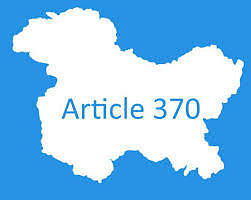
Today Union Home Minister Amit Shah has recommended to scrapped Article 370 in Jammu & Kashmir. The minister has introduced the option of reservation for the people of Jammu & Kashmir instead.
These days, the issue of Jammu and Kashmir is in full swing. Various rumours have been spreading not only across the country but also in the world.
Defying all these rumours, the union home minister has presented the exercise to end Article 370 today, August 05, 2019.
Do you know what is Article 370, why it was applicable only in Jammu & Kashmir?
Through this article, we are going to tell you all about Article 370. This will not only help you to enhance your general knowledge but will also help to score well in the competitive exam.
Also Read: What is Article 35-A and Why it is a topic of discussion for Kashmir?
What is Article 370?
Article 370 of the Indian constitution is an Article that gives special status to the state of Jammu & Kashmir. The article is drafted in Part XXI of the Constitution: Temporary, Transitional and Special Provisions.
Article 370 was designed to protect rights. Article 370 comprised six special provisions for Jammu and Kashmir:
1. It exempted the Jammu & Kashmir State from the complete applicability of the Constitution of India and allowed states to have its own Constitution.
2. However, Central legislative powers over the State were limited to the three subjects of defence, foreign affairs and communications.
3. Other constitutional powers of the Central Government could not be applicable on the State without the concurrence of the State Government.
4. The 'concurrence' was only provisional and It had to be ratified by the State's Constituent Assembly.
5. The State Government's authority to give 'concurrence' lasted only until the State Constituent Assembly was convened. Once the State Constituent Assembly finalised the scheme of powers and dispersed, no further extension of powers was possible.
6. Article 370 could be abrogated or amended only upon the recommendation of the State's Constituent Assembly.
Why it was Applicable in Jammu & Kashmir?
On 26 October 1947, Maharaja Hari Singh signed the Instrument of Accession under clause 7 which states that the State could not be compelled to accept any future Constitution of India. As per the provisions of the clause, the State was within its rights to draft its own Constitution and to decide for itself what additional powers to extend to the Central Government.
Various reactions came on this historical decision of the Union Minister Amit Shah to scrapped Article 370 from Jammu & Kashmir. We are sharing some of these here.....
Home Minister Amit Shah has proposed to build two separate union territories;
1. Jammu & Kashmir
2. Ladakh
(Check Tweets)
HM Amit Shah: Jammu and Kashmir to be a union territory with legislature and Ladakh to be union territory without legislature pic.twitter.com/nsEL5Lr15h
— ANI (@ANI) August 5, 2019
GN Azad,Cong: I strongly condemn the act of 2-3 MPs(PDP's Mir Fayaz and Nazir Ahmed Laway who attempted to tear constitution). We stand by the constitution of India. Hum Hindustan ke samvidhaan ki raksha ke liye jaan ki baazi laga denge, but today BJP has murdered constitution pic.twitter.com/wtswg0s7dK
— ANI (@ANI) August 5, 2019
Satish Chandra Mishra, BSP MP, in Rajya Sabha: Our party gives complete support. We want that the Bill be passed. Our party is not expressing any opposition to Article 370 Bill & the other Bill. pic.twitter.com/ajRNKwsUlf
— ANI (@ANI) August 5, 2019
Today marks the darkest day in Indian democracy. Decision of J&K leadership to reject 2 nation theory in 1947 & align with India has backfired. Unilateral decision of GOI to scrap Article 370 is illegal & unconstitutional which will make India an occupational force in J&K.
— Mehbooba Mufti (@MehboobaMufti) August 5, 2019
Also Read: What Will happen in Jammu and Kashmir after the Revocation of Article 370 and Article 35A?








